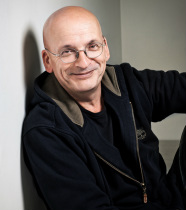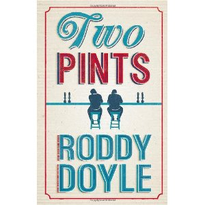 Roddy Doyle Photo by Mark Nixon Roddy Doyle was born in 1958. His work includes The Commitments, Paddy Clarke Ha Ha Ha (Booker Prize, 1993), The Woman Who Walked Into Doors, A Star Called Henry, and Bullfighting. His latest book is Two Pints (2012). A new novel, The Guts, will be published in August, in Ireland and the UK, and early 2014 in the USA. He divides his time between Dublin and confusion. RUSTY TALK WITH RODDY DOYLE Kathryn Mockler: What is your first memory of writing creatively? Roddy Doyle: I was about ten, I think, and my teacher, Mr. Kennedy, told the class to write something about a rainy day. This was Ireland, remember, so deep research wasn’t necessary. There were fifty-four boys in the class, and it was the first time we’d been told to write, or compose, anything—to make it up. I wrote about boredom. Mr. Kennedy looked over my shoulder, then read it to the class. KM: Why did you become a writer? RD: I loved reading. I loved football—soccer—but was a hopeless player. I loved music but hadn’t the patience or ability to learn an instrument. But I was literate, so writing seemed like an easy option. I forced myself into the habit, the routine. KM: What is the best writing advice that you’ve gotten that you actually use? RD: Treat it as a job; don’t expect magic. KM: How do you approach revision? RD: If by ‘revision’ you mean editing, I love it. So I approach it with a full heart and a red ballpoint. I tend to, deliberately, write too much. Editing is often a case of paring back. I’m fascinated, and sometimes worried, about how the deletion or addition of a word can alter meaning, tone, everything. When I’m editing, I put all other work aside and concentrate only on the pages I’m editing. I don’t play music, and I often lose track of time. KM: Your books often come out within a few years of each other. Do you work on multiple projects at the same time or stick to one project until it’s complete? Do you have difficultly switching from one genre to the next—particularly from adult fiction to children’s literature? RD: I work on different projects at the same time; I divide my working day, about 9am to 6pm, into chunks. As long as the projects are very different, they don’t tend to infect each other. I play a different type of music for each project. I could, I suppose, change shirts too, but that might be going too far. So, I can work for several hours on a novel, save it, hang out the washing, make a cup of coffee, change the Rolling Stones for Steve Reich, and get working on a treatment for a possible TV series or a book for children. KM: What writers were influential when you first started writing? Who are you reading now? RD: I think Flann O’Brien was important, particularly the Dublin dialogue in At Swim-Two-Birds. E.L. Doctorow’s Ragtime was important—the simplicity of the language. I’ve just finished George Saunders’ collection, Tenth of December; I think it’s magnificent. I’m reading a collection of J.G. Ballard interviews, called Extreme Metaphors. It’s great. KM: Given the amount of books that you’ve written, it seems impossible to imagine, but do you ever get writer’s block? And if you do, how do you overcome it? RD: No—never. KM: Do you ever abandon projects? If so, how do you know when it’s time to move on? RD: I’ve never abandoned, but I’ve parked projects for a while, stayed away from them until I was ready to look at them with that mixture of calm and excitement that I need if I’m going to work. Because I work on several things during the day, if one project isn’t going well, I can focus on another. KM: We often talk about the difficulty of rejection for writers but what about the problems that success can bring? After you won the Booker Prize in 1993 for Paddy Clarke Ha Ha Ha, for instance, what was it like sitting back down at the writing desk? RD: Success, however we measure it, is much nicer than rejection. But rejection can be like fuel to an almost empty engine. Rejection is a cousin of determination, and it’s part of the job. Success is too, if you’re lucky. The trick is, I think, to ignore it when you’re at your desk. I never let myself think that, just because I’ve won a prize, I’m not capable of writing shit. After winning the Booker, I couldn’t wait to get back to work. I love the work. KM: You posted your latest work Two Pints, which was just published in its entirety in November, as a serial on Facebook over the last year and half. Why did you decide to do this and what was the process like for you? Did the process have any affect on the end product? In other words, did the reader comments influence revisions? Would you do it again with another project? RD: I wrote the Two Pints pieces for fun. Someone suggested they’d make a good book, so—grand. It’s an accidental book, and still fun. I still write the Two Pints pieces, when the mood hits me and I have time. I often compose them as I’m walking, say, from the city centre, home. I type them up, make sure they’re less than 200 words, then post them on Facebook. I like the near-spontaneity of it—very different from how I normally work. It’s a little madness. I didn’t revise them, so reader comments, while nice, had no influence on them. I’d never be tempted to put work-in-progress up on Facebook. I don’t want to know what readers think until I know the work is finished. KM: What are you working on now? RD: I’ve just finished a novel, called The Guts. It’ll be out here and the UK in August, and the USA early in 2014. I’m writing a short story, about a man who’s injured when another man, in Lycra, cycles into him. I’m also working on a treatment for a possible TV series. ‘Possible’ is code for ‘It’ll never be made.’ I’m enjoying the job. Later this year, a musical based on my book, The Commitments, will go into rehearsal. I wrote the script, the ‘book’, so that will take up a lot of my time. I’m very excited about it. I’m tempted to say ‘I can’t wait’ but, actually, I can—just.  RODDY DOYLE'S LATEST BOOK Two Pints, published by Jonathan Cape, Vintage Publishing, 2012 Description from the publisher: Two men meet for a pint in a Dublin pub. They chew the fat, set the world to rights, take the piss… They talk about their wives, their kids, their kids’ pets, their football teams and--this being Ireland in 2011–12--about the euro, the crash, the presidential election, the Queen’s visit. But these men are not parochial or small-minded; one of them knows where to find the missing Colonel Gaddafi (he’s working as a cleaner at Dublin Airport); they worry about Greek debt, the IMF and the bondholders (whatever they might be); in their fashion, they mourn the deaths of Whitney Houston, Donna Summer, Davy Jones and Robin Gibb; and they ask each other the really important questions like ‘Would you ever let yourself be digitally enhanced?’ Inspired by a year’s worth of news, Two Pints distils the essence of Roddy Doyle’s comic genius. This book shares the concision of a collection of poems, and the timing of a virtuoso comedian. |
Rusty Talk
Rusty Talk Editor: Archives
November 2017
Categories
All
|

 RSS Feed
RSS Feed
